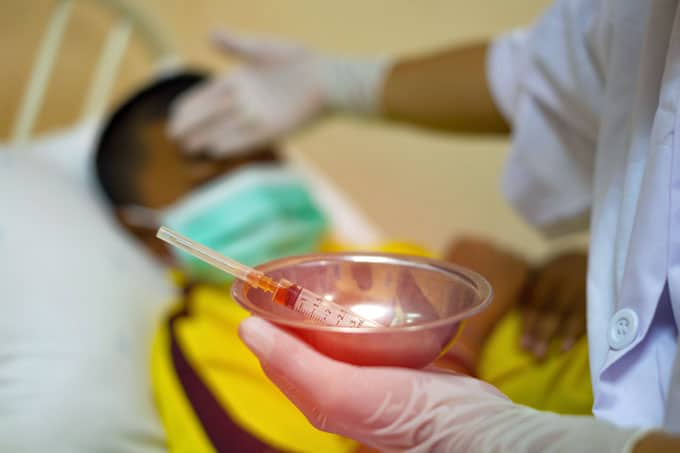
The Red Cross is concerned about the many cases of dengue infection in popular holiday countries such as the Philippines, Thailand and Vietnam. Hospitals in various Asian countries can no longer cope with the number of patients with the tropical infectious disease.
In the Philippines, Bangladesh and Cambodia, the Red Cross is setting up mobile clinics to treat the many sick people. Emergency services also work around the clock to supply hospitals with blood.
In many countries, the number of dengue infections is much higher than last year. In the Philippines, there are 146.000 infections, twice as many as last year. There dengue is now seen as a national epidemic. In the meantime, 622 people have died from the disease in the Philippines, mainly children under the age of 10.
The outbreak is also worrying in Vietnam, more than 80.000 people have contracted the disease, three times as many as last year. The World Health Organization reports that there are more than 62.000 infections in Malaysia, almost double from last year. The disease also occurs in Bangladesh, Thailand and Laos.
What is Dengue?
Dengue, also known as dengue fever, is a virus that you can get through the bite of an infected Aedes mosquito, specifically the yellow fever mosquito (Aedes aegypti) and the Asian tiger mosquito (Aedes albopictus). Dengue does not occur in the Netherlands, but it does occur in (sub)tropical areas. An infected mosquito can get you not only in Southeast Asia, but also in Africa, Central and South America and the Caribbean.
Precautionary measures
You cannot, as with malaria, protect yourself in advance with medication or get vaccinated. That is why it is important to take good precautions to prevent dengue. “A mosquito net while sleeping at night does not help,” says health expert Marina Manger Cats of the Red Cross. “A mosquito net for an afternoon nap or a sleeping baby during the day helps. The mosquitoes that carry the virus sting during the day.”
“Make yourself well with a mosquito repellent that contains enough DEET. Also take sunscreen into account when applying it, so that it doesn't get in each other's way. Leave the sunscreen on for at least half an hour and only then apply the mosquito protection to the skin. Covering clothing also helps against mosquito bites.”
Dengue virus symptoms
How do you know you have the dengue virus? It can take 3 to 14 days after a mosquito bite to show symptoms. If you have the following complaints, always contact your doctor and mention that you have been in a dengue area:
- Sudden onset fever (up to 41°C) with chills.
- Head, muscle and joint pain.
- Nausea and vomiting.
- Cough and sore throat.


My wife and I have planned our hibernation from November to May and are wondering if we should be concerned about the dengue outbreak. We go to Jomtien, Hua Hin, the islands of Krabi, Cambodia and Malaysia.
As you have been able to read, it is important to always be alert to a dengue infection. You can get infected all over Thailand and my area was quiet this summer with infections, but there have been several infections in Pattaya in my village a few years before and the English were the most popular. I myself usually keep my body covered with clothing, such as long pants. There are quite a few tourists who display the body, because oh it is so hot and are therefore attractive to the mosquito. So either rub in or cover and look out for the places where hotbeds can be. Much has already been written about this, including on this blog. You never have 100 percent coverage and why people are sometimes present in the wrong place at the wrong time and are infected, I have no answer to that.
Due to the greater amount of monsoon rains this year, there are many more (infected) mosquitoes.
Avoid areas with stagnant fresh water.
It is better to skip Malaysia this year. I don't know Cambodia.
Take a few steps yourself.
I usually stay for a longer period of time in Kanchanaburi on the River Kwai and I have already seen people spraying what looks like a leaf blower into the sewer covers, resulting in a lot of smoke and noise. I think this is to fight those mosquitoes and also because people live there close to the great river Kwai and there is probably a lot of risk of infection.
That is a nebulizer and it is used everywhere in Thailand. But it does not reach the places near your own house where water remains; a tin can, an old tire, a bucket with some water left over. The dengue larva can even grow in polluted water.
Hello
I read in the article that you can get vaccinated against malaria, or take medication as a precaution, can someone give some more information about that. I have asked the GGD and the GP, who is also allowed to administer travel vaccinations, several times whether there is a vaccination for this, but I always get the answer NO.
Eg thanks Jacqueline.
Dear Jacqueline,
There are several pills against malaria.
Strange that the GGD and GP do not give a clear answer.
Known is Doxycycline and Malarone.
If you come to a malaria area, you can take 1 pill of Doxycycline from the first day.
Do this in consultation with a local doctor, clinic or hospital.
Jacqueline, you're not there with malaria alone. Dengue, chikungunya, elephantiasis, zika, japanese encephalitis, there is nothing against that yet. Malaria pills give you a false sense of security AND there is already resistance to almost all existing malaria drugs.
Protect yourself with physical means: clothing, ointments, a fan, good screens and, if necessary, a mosquito net.
If you do take a pill, do so in consultation with your doctor, who knows your medical condition best and can assess whether interaction with your medication can occur.